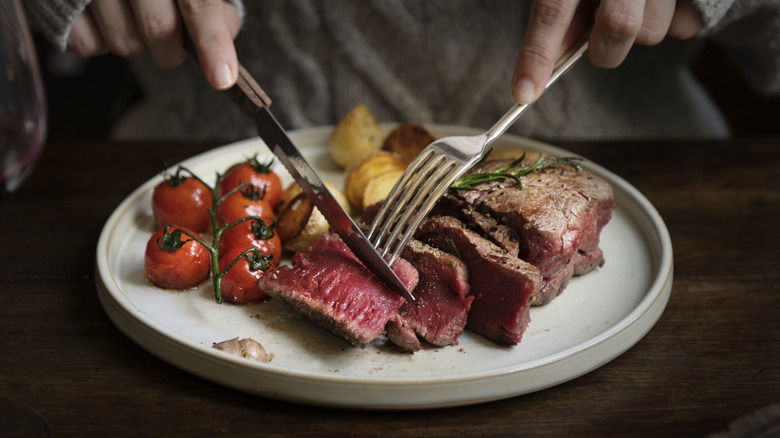What Happens To Your Liver When You Don't Eat Enough Protein
Most discussions about healthy eating include the topic of protein, and for good reason. Protein, one of the macronutrients our body needs, is considered the building block of human cells, per Harvard Health. You need protein for good hair, skin, nails, muscles, bones, hormone regulation, and more.
Turns out that the largest internal organ, the liver, is also negatively impacted when your diet doesn't contain enough protein. According to a 2020 study published in Liver International, there could be a link between non-alcoholic fatty liver disease and a low-protein diet. The study examined liver samples of 19 obese people with non-alcoholic fatty liver (via Science Daily). The subjects were asked to follow either a high-protein, calorie-reduced diet or low-protein, calorie-reduced diet for three weeks. After the trial period, the liver fat content in the former group had reduced by 40%, while the latter group's fat content remained the same as before.
Researchers suppose that the results have to do with how the genes responsible for fat absorption, storage, and synthesis react to each diet. With the high-protein group, these genes appear to have been suppressed. Furthermore, protein malnutrition, also known as kwashiorkor, manifests in a fatty liver too, per SELF. Does this mean you should be upping your protein intake in general?
How much protein should you be eating?
High-protein diets are all the rage in the fitness community, and they have slowly found their way into the lives of those who don't necessarily work out as well. But just how much protein should you be aiming for in order to maintain the healthy function of your cells, tissues, and organs?
According to Harvard Health, this is a difficult question to answer. There are weight-based measurements, activity-level-based numbers, and concerns about where you're getting your protein from. For someone who weighs 140 pounds, the upper limit could be 125 grams per day, suggests Harvard Health, but this number could change based on new research.
Even so, there is such a thing as eating too much protein. Interestingly, non-alcoholic fatty liver disease has been linked with the consumption of too much protein too. "Fatty liver disease is a manifestation of too much triglyceride accumulation in the liver ... If you eat too many carbohydrates and proteins, they can be converted to triglycerides. These are stored in the fat cells, and can be deposited in the liver," explained gastroenterologist Deepa Shah (via Honor Health). Perhaps this is a reminder of how too much of a good thing can also become bad for your body.
What's an ideal diet to aim for?
It can start to get confusing when macronutrient content recommendations aren't clear-cut. This is probably one of the reasons why healthcare professionals advocate for balanced and nutritious meals.
Fruits, vegetables, whole grains, healthy fats, and protein from the right sources combined with low added sugar might be a smart way to go about things (via Centers for Disease Control and Prevention). Speaking about the right sources of protein, aim for lean beef, skinless chicken breast, eggs, salmon, low-fat cottage cheese, and lentils, shared registered dietitian nutritionist Lauren Manaker (per Eating Well). It might also be worth noting that there was a 2015 study published in the Journal of Hepatology that linked an increase in animal protein with fatty liver disease in elderly and obese people.
If you're generally healthy and like the benefits of protein or follow an active lifestyle and want to maintain a high-protein diet, make sure you spread your protein consumption throughout the day, per Harvard Health. Work with your healthcare provider if you have any underlying health conditions like diabetes, heart disease, fatty liver disease, or kidney issues before adding or reducing any nutrients to your diet. It's all about finding a diet plan that works for you.



